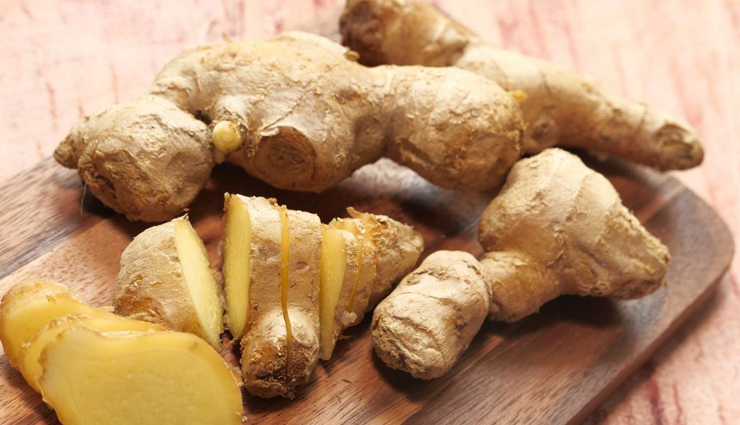8 Most Amazing Health Benefits of Ginger

The robust flavor and distinctive pungent aroma of ginger make it a versatile addition to various culinary creations. Furthermore, it plays a vital role in numerous medicinal formulations. In Indian households, ginger-infused tea is a common remedy for alleviating coughs and colds. As awareness of its benefits grows, many Western cuisines now incorporate ginger into their dishes. Examples include gingerbread, ginger cake, ginger snaps, and ginger ale. Explore further about the manifold advantages of ginger below. Keep reading to delve deeper into this versatile ingredient!

Thanks to its antihistamine properties, ginger proves effective in addressing allergies. It not only prevents airway constriction but also stimulates mucus secretion. For centuries, ginger has served as a natural remedy for combating colds and flu. A combination of a teaspoon of ginger juice and honey can effectively alleviate the persistent cough and sore throat symptoms typically associated with colds. Ginger tea, on the other hand, aids in clearing congestion in the throat and nasal passages. A blend of fresh ginger juice and fenugreek is a valuable approach to treating asthma, promoting better respiratory health. Additionally, ginger has been identified as a beneficial remedy for stomach flu and food poisoning, making it one of its most widely recognized applications.
Ginger is widely acknowledged as the premier herb for enhancing digestion. When ginger is consumed, it prompts the gallbladder to discharge bile, thereby promoting the digestive process and facilitating the absorption of nutrients from our meals. Furthermore, ginger offers relief from stomach cramps, diarrhea, and bloating often associated with gastritis. To support digestion, ginger can be ingested in the form of tea or supplements.
Chemotherapy is a treatment typically prescribed post-cancer surgery to eradicate cancerous cells and minimize the risk of disease recurrence. Ginger root supplements have been shown to be beneficial in alleviating the nausea induced by chemotherapy when used in conjunction with other anti-nausea medications. Over 70 percent of cancer patients exposed to chemotherapy radiation suffer from vomiting and nausea. The consumption of ginger root supplements or ginger juice prior to chemotherapy can effectively reduce symptoms of nausea and vomiting due to the anti-inflammatory properties ginger offers to the body. Additionally, ginger has been observed to be effective in addressing feelings of nausea related to motion sickness, seasickness, and migraines.
Ginger offers significant advantages in the treatment of chronic inflammation. It not only provides substantial relief from pain resulting from inflammation but also reduces swelling and morning stiffness. Ginger is effective in inhibiting the enzymes cyclooxygenase and five-lipoxygenase, which are responsible for triggering inflammation. These anti-inflammatory properties of ginger contribute to elevated serotonin and dopamine levels in the brain, thereby enhancing brain function.
A study carried out by the University of Michigan Medical School found that ginger root supplements, when administered to individuals suffering from colon inflammation, proved highly effective in mitigating the condition.
The analgesic and anti-inflammatory attributes of ginger prove highly effective in diminishing pain and swelling in patients dealing with knee osteoarthritis, rheumatoid arthritis, and general muscle discomfort. Ginger root serves as a potent pain reliever, particularly for individuals who need to rely on painkillers to alleviate arthritis-related inflammation. Incorporating ginger oil into your bath can provide relief from muscle and joint aches. When faced with muscle strain, a warm mixture of ginger paste and turmeric can be applied for relief. For those who regularly include ginger root supplements in their diet, the need for painkiller medication is significantly reduced. Consequently, ginger offers considerable benefits in alleviating pain associated with rheumatoid arthritis and osteoporosis.
Ginger can be utilized both externally and internally for addressing inflammation. To prepare a ginger-infused bath, bring 100 ml of water to a boil with a few slices of ginger. Cover the vessel to prevent the volatile oils from escaping. Allow it to sit for 10 minutes, then incorporate this mixture into your regular bathwater. Regular use of this water can help alleviate the aches and pains associated with fibromyalgia.
The consumption of ginger at the onset of the menstrual period may alleviate the symptoms of menstrual pain for certain women. In Chinese medicine, ginger tea sweetened with brown sugar is commonly employed to address menstrual cramps.
Australian research scientists have proposed that ginger possesses the ability to reduce blood glucose levels within the body. As blood glucose levels directly influence the dynamics of weight gain or loss and your daily energy levels, the consistent incorporation of ginger root supplements in any format can lead to a noticeable impact on your blood sugar levels. Individuals susceptible to low blood sugar should make it a practice to include ginger root supplements in their regular diet to prevent such issues. Ginger has also demonstrated effectiveness in reducing the occurrence of diabetic nephropathy, a form of kidney damage.
Ginger's carminative quality, which facilitates the expulsion of gas, makes it an effective remedy for soothing an upset stomach. This property not only alleviates bloating but also reduces the occurrence of flatulence. To obtain relief from flatulence, it is recommended to consume ginger in doses of 250 to 500 mg, 2 to 3 times daily.